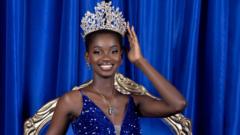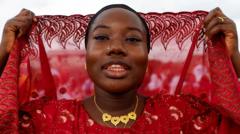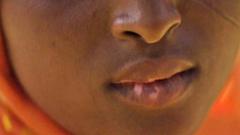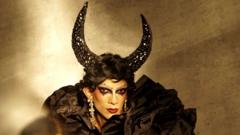The Miss Ivory Coast pageant has introduced new rules prohibiting wigs and hair extensions for contestants, encouraging a celebration of natural beauty. This decision resonates with many participants, reflecting a significant cultural change in beauty perceptions amid growing debates over standards and personal expression.
Embracing Natural Beauty: Miss Ivory Coast Pageant Enforces Wig Ban for Contestants

Embracing Natural Beauty: Miss Ivory Coast Pageant Enforces Wig Ban for Contestants
The Miss Ivory Coast competition has banned wigs and extensions to promote natural beauty among contestants, sparking a cultural shift in beauty standards.
In a remarkable shift for beauty pageants in Ivory Coast, the Miss Ivory Coast competition has taken bold steps to redefine beauty standards. Contestants will no longer be allowed to wear wigs or hair extensions during the preliminary stages, emphasizing a return to natural hair. This decision marks a significant change in a country where artificial hairstyles have long been the norm, particularly within the pageant world.
For the first time in over sixty years, natural hair took center stage when Marlène-Kany Kouassi became Miss Ivory Coast in 2022, wearing her crown with her short natural hair. This victory has now paved the way for a broader acceptance of natural beauty, reflecting a growing movement against Western beauty ideals that often dominate such contests.
Victor Yapobi, the president of the Miss Ivory Coast organizing committee, explained that the ban aims to showcase authenticity among contestants. “Beauty must be raw,” he stated, underscoring the importance of presenting a genuine version of beauty. This initiative is unique in Africa and aims to shift perceptions regarding cosmetic surgery and skin lightening practices, which are often frowned upon.
The competition has also modified other entry requirements, raising the maximum age to 28, lowering the entry fee, and allowing women of shorter heights to participate. These changes come in response to the financial strains many contestants face, with the entrance fee initially posing a significant barrier.
Contestants participating in the preliminary rounds have expressed mixed feelings about the new rules. While some, like 21-year-old Emmanuella Dali, have welcomed the change, feeling more empowered without wigs, others lament the loss of creative expression that artificial hair brings. Historian and hairstylist Ange Sea expressed concern over the economic impact on the hair industry, which thrives on the demand for wigs and weaves.
The move has sparked lively discussions across the nation, highlighting the ongoing conflict between traditional beauty standards and the growing natural hair movement that encourages women to embrace their roots. Florence Edwige Nanga, a hair specialist, pointed out that while natural hair is becoming more accepted, pressures and stereotypes still persist in media representations.
As the competition progresses, the implications of these changes extend beyond the pageant stage, with potential effects on societal perceptions of beauty in the broader context of Ivory Coast. The ultimate outcome may lead to a more diverse acceptance of beauty that celebrates both natural hair and wigs.
Yapobi remained optimistic about the future of the competition, suggesting that if the ban proves successful, it could influence future pageants significantly. As the finalists prepare for the grand event in June, the paradigm shift towards natural beauty continues to unfold, offering contestants a newfound sense of pride and identity regardless of their final standings.



















